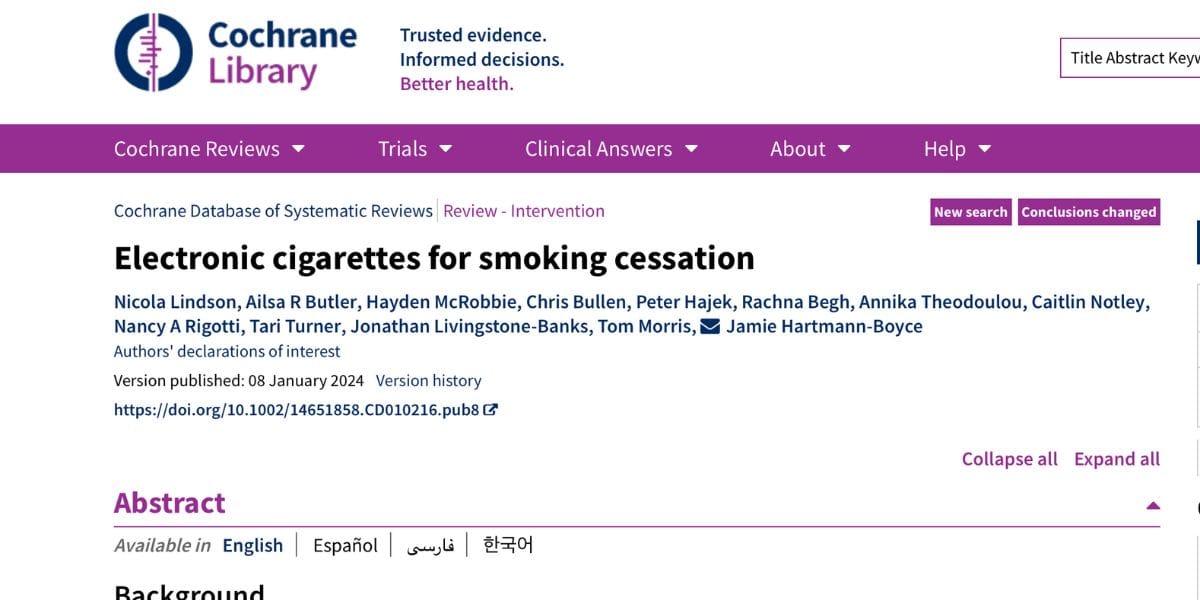The latest update of the Cochrane review, published on 8 January, confirms that nicotine electronic cigarettes increases quit rates more than gums and nicotine patches. Moreover, a new study published in the New England Journal of Medicine shows the the addition of e-cigarettes to standard smoking-cessation counseling result in greater abstinence from tobacco use among smokers.
The main goal of the Cochrane review is to examine the safety, tolerability and effectiveness of using electronic cigarettes (ECs) to help people who smoke tobacco achieve long‐term smoking abstinence, in comparison to non‐nicotine EC, other smoking cessation treatments and no treatment. The review is a virtual encyclopedia on all aspects of ENDS (e-cigarettes, vapes) and cessation.
In their latest update, researchers included 88 completed studies (10 new to this update), representing 27,235 participants, of which 47 were randomized controlled trials (RCTs).
Of the included studies, researchers rated ten (all but one contributing to our main comparisons) at low risk of bias overall, 58 at high risk overall (including all non‐randomized studies), and the remainder at unclear risk.
Data confirms that there is high certainty that nicotine electronic cigarettes increases quit rates compared to nicotine replacement therapy. The update confirms the evidence published in the November version, but, with the addition of 10 studies for this review, the Cochrane authors have increased their confidence ratings from GRADE: MODERATE to HIGH confidence for ENDS as more effective than NRT (nicotine replacement therapy) and increased to GRADE: LOW confidence for ENDS increased effectiveness compared to behavioral support/no support.
Moreover, no serious adverse event were detected deform the nicotine electronic cigarette use. Considering the longest follow up of two years included in the study lasted two years, researchers stressed that more studies and longer follow up are needed to confirm the evidence.
But it’s not the only recently published evidence demonstrating the quitting potential of e-cigarettes when paired with counseling. In an article recently published in the New England Journal of Medicine, the addition of e-cigarettes to standard smoking-cessation counseling resulted in greater abstinence from tobacco use among smokers than smoking-cessation counseling alone.
“Another groundbreaking RCT just featured in the important journal proves we have been right – commented Riccardo Polosa – ecigs significantly outperform traditional cessation methods in achieving lasting tobacco abstinence. This study adds to the growing body of irrefutable evidence that e-cigarettes could be the gamechanger in smokingcessation”
Researchers assigned randomly adult smokers who want to quit to an intervention group, which received free e-cigarettes and e-liquids, standard-of-care smoking-cessation counseling, and optional (not free) nicotine-replacement therapy, or to a control group, which received standard counseling and a voucher. A total of 1246 participants underwent randomization; 622 participants were assigned to the intervention group, and 624 to the control group. The percentage of participants with validated continuous abstinence from tobacco smoking was 28.9% in the intervention group and 16.3% in the control group.
A study that stressed the potential of electronic cigarettes in assisting smokers who want to quit.
The Cochrane review is one of 16 systematic reviews in the In Silico Science umbrella review, a tertiary synthesis of systematic reviews. The Cochrane review update added 6 primary studies to the CoEHAR analyses. It increases researchers’ confidence in their conclusions that ENDS are more effective than NRT and possibly more effective than other cessation treatments or quit methods.
“This review provides new and additional evidence for our umbrella review on ENDS and cessation” said Dr. O’Leary. “And we will be reporting an important finding when the umbrella review is published (hopefully soon). Your spoiler: none of the 16 reviews found ENDS to be less effective“.
To read all the evidence, visit the link.




